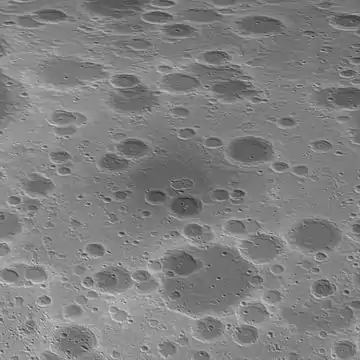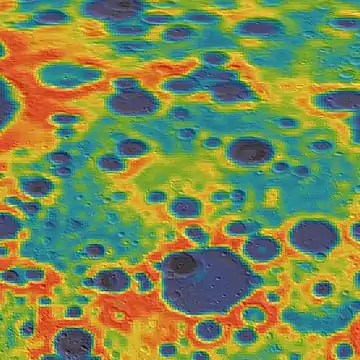 Oblique Lunar Orbiter 5 image, with the approximate extent of the basin highlighted in red | |
| Coordinates | 52°00′N 123°00′W / 52.0°N 123.0°W |
|---|---|
| Diameter | 530 km[1] |
| Eponym | Coulomb and Sarton craters |
The Coulomb-Sarton Basin is a Pre-Nectarian impact basin on the far side of the Moon.[2] It is named after the crater Coulomb northeast of the center of the basin and the smaller crater Sarton just south of the center. The basin is not obvious on the lunar surface. There are only small fragments of inner rings and a rim, and the most indicative topographic feature is a smooth, low plain at the center.
At the center is a mass concentration (mascon), or gravitational high. The mascon was first identified by Doppler tracking of the Lunar Prospector spacecraft.[3] The existence of the basin was confirmed by the GRAIL spacecraft.[4]
Other craters within the basin include Weber and Kramers. At the approximate margin of the basin are Dyson, Ellison, Stefan, Wegener, Wood, Landau, and Gullstrand. The large crater Birkhoff is to the northwest.
 Topographic map
Topographic map Gravity map based on GRAIL
Gravity map based on GRAIL
External links
- Lunar Orbiter 5 frame 015 h3 shows most of the basin at top of image
- Lunar Orbiter 5 frame 006 med shows all of the basin
References
- ↑ The geologic history of the Moon, 1987, Wilhelms, Don E.; with sections by McCauley, John F.; Trask, Newell J. USGS Professional Paper: 1348. (online)
- ↑ "Impact Basin Database". Archived from the original on 2014-08-07. Retrieved 2015-12-05.
- ↑ A. S. Konopliv; A. B. Binder; L. L. Hood; A. B. Kucinskas; W. L. Sjogren; J. G. Williams (1998). "Improved Gravity Field of the Moon from Lunar Prospector". Science. 281 (5382): 1476–1480. Bibcode:1998Sci...281.1476K. doi:10.1126/science.281.5382.1476. PMID 9727968.
- ↑ Neumann, Gregory A.; Zuber, Maria T.; Wieczorek, Mark A.; Head, James W.; Baker, David M. H.; Solomon, Sean C.; Smith, David E.; Lemoine, Frank G.; Mazarico, Erwan; et al. (2015). "Lunar impact basins revealed by Gravity Recovery and Interior Laboratory measurements". Science Advances. 1 (9): e1500852. Bibcode:2015SciA....1E0852N. doi:10.1126/sciadv.1500852. ISSN 2375-2548. PMC 4646831. PMID 26601317.